Films with theme "La condition juive en France sous l'Occupation allemande", sorted by revenue

The Round Up (2010)
, 1h55Directed by Roselyne Bosch
Origin France
Genres Drama, War, Historical
Themes French war films, Films about religion, Political films, Films about Jews and Judaism, Histoire de France, L'Occupation allemande en France, La condition juive en France sous l'Occupation allemande
Actors Mélanie Laurent, Jean Reno, Sylvie Testud, Gad Elmaleh, Raphaëlle Agogué, Hugo Leverdez
Jo Weisman, a young Jewish Parisian, and his family are taken by the Nazis and Vichy collaborators in the rafle du Vel' d'Hiv. Anna Traube, a 20-year-old woman, walks out of the velodrome with forged papers; her mother and sister are captured. Annette Monod, a Protestant nurse, volunteers for the velodrome, and assists Jewish doctor David Sheinbaum. From the Vélodrome d'Hiver Jo's family and Sheinbaum are transferred to the Beaune-la-Rolande internment camp. Monod comes along. She does what she can to help the children, who are soon falling sick from the camp diet and conditions.

A Secret (2007)
, 1h40Directed by Claude Miller
Origin France
Genres Drama
Themes Films about families, Political films, Histoire de France, L'Occupation allemande en France, La condition juive en France sous l'Occupation allemande
Actors Cécile de France, Patrick Bruel, Ludivine Sagnier, Julie Depardieu, Mathieu Amalric, Nathalie Boutefeu
The film follows Maxime Nathan and his Jewish family in France during the years leading up to World War II. François Grimbert (played as a young boy by Valentin Vigourt and as an adolescent by Mathieu Amalric) grows up in Paris in the 1950s. He is the skinny, sickly son of two marvelously athletic parents, Tania (Cécile de France) and Maxime (Patrick Bruel). For a while, he dreams of a stronger, fitter, more charismatic older brother to compensate for his own feelings of inadequacy. Only gradually does he learn of his parents' tragic past and that he has a sibling — a half-brother named Simon, his father's first son.
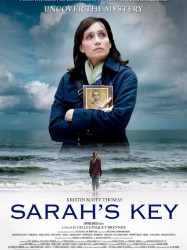
Sarah's Key (2010)
, 1h51Directed by Gilles Paquet-Brenner
Origin France
Genres Drama, War
Themes Pregnancy films, Films about religion, Films about sexuality, Political films, Films about Jews and Judaism, Histoire de France, L'Occupation allemande en France, La condition juive en France sous l'Occupation allemande
Actors Kristin Scott Thomas, Niels Arestrup, Arben Bajraktaraj, Mélusine Mayance, Frédéric Pierrot, Aidan Quinn
In 1942, 10-year-old Sarah Starzynski (Mélusine Mayance) hides her younger brother from French police by locking him in a secret closet and telling him to stay there until she returns. She takes the key with her when she and her parents are transported to the Vélodrome d'Hiver, where they are held in inhuman conditions by the Paris Police and French Secret Service.
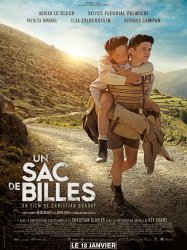
A Bag of Marbles (2017)
, 1h53Directed by Olivier Dahan, Christian Duguay
Origin France
Genres Drama, War
Themes Films about children, La provence, Histoire de France, L'Occupation allemande en France, La condition juive en France sous l'Occupation allemande
Actors Patrick Bruel, Dorian Le Clech, Elsa Zylberstein, Kev Adams, Christian Clavier, Bernard Campan
Dans la France occupée, Maurice et Joseph, deux jeunes frères juifs, sont envoyés par leurs parents dans la zone libre et font preuve de malice, de courage et d’ingéniosité pour échapper aux occupants et tenter de réunir à nouveau leur famille.

Au Revoir les Enfants (1987)
, 1h43Directed by Louis Malle
Origin France
Genres Drama, War
Themes French war films, Films about children, Films about religion, Scoutisme, Political films, Films about Jews and Judaism, Histoire de France, L'Occupation allemande en France, La condition juive en France sous l'Occupation allemande
Actors Raphaël Fejtö, Gaspard Manesse, Philippe Morier-Genoud, François Berléand, Francine Racette, Stanislas Carré de Malberg
During the winter of 1943-44, Julien Quentin, a student at a Carmelite boarding school in occupied France, is returning to school from vacation. He acts tough to the students at the school, but he is actually a pampered mother's boy who still wets his bed. Saddened to be returning to the tedium of boarding school, Julien's classes seem uneventful until Père Jean, the headmaster, introduces three new pupils. One of them, Jean Bonnet, is the same age as Julien. Like the other students, Julien at first despises Bonnet, a socially awkward boy with a talent for arithmetic and playing the piano.

Army of Crime (2009)
, 2h19Directed by Robert Guédiguian
Origin France
Genres Drama, War, Historical
Themes French war films, Political films, Histoire de France, L'Occupation allemande en France, La condition juive en France sous l'Occupation allemande
Actors Virginie Ledoyen, Simon Abkarian, Robinson Stévenin, Grégoire Leprince-Ringuet, Lola Naymark, Jean-Pierre Darroussin
In Paris during the German occupation, an ill-assorted group of resistance fighters commits disorganized attacks. Missak Manouchian, an Armenian exile, is ready to help but is reluctant to kill; for him, being ready to die but not to kill is an ethical matter. However, circumstances lead him to abandon his reluctance. Under his leadership, the group structures and plans its actions and thus the Manouchian network is born. The film traces the story of this group, from its shaping to the execution of its members in 1944.
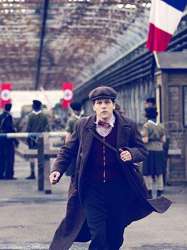
Resistance (2020)
Directed by Jonathan Jakubowicz
Origin France
Genres Drama, War, Biography, Comedy, Comedy-drama, Documentary, Historical
Themes Histoire de France, L'Occupation allemande en France, La condition juive en France sous l'Occupation allemande
Actors Jesse Eisenberg, Ed Harris, Édgar Ramírez, Clémence Poésy, Matthias Schweighöfer, Bella Ramsey
Durant la Seconde Guerre mondiale, en 1942, Marcel Mangel s'engage, sous le nom de Marcel Marceau, dans la Résistance française, sous l'influence de son frère Simon et de son cousin, Georges Loinger. En partie par le mime, il aidera de nombreux enfants orphelins, dont les parents ont été tués par les nazis.
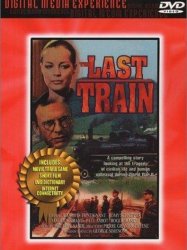
The Last Train (1973)
, 1h35Directed by Pierre Granier-Deferre
Origin France
Genres Drama, War, Historical, Romance
Themes Transport films, Rail transport films, Political films, Histoire de France, L'Occupation allemande en France, La condition juive en France sous l'Occupation allemande, Film se déroulant dans un train
Actors Jean-Louis Trintignant, Romy Schneider, Maurice Biraud, Régine, Nike Arrighi, Serge Marquand
In May 1940 a packed train takes refugees from a French village near the Belgian border away from the advancing German forces.. On it are Julien, a short-sighted radio repairer, and his pregnant wife and daughter. The women are given priority in a carriage at the front while he has to scramble into a cattle truck at the rear. There he is struck by a mysterious and beautiful young woman on her own.
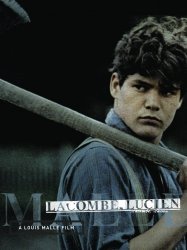
Lacombe, Lucien (1974)
, 2h12Directed by Louis Malle
Origin France
Genres Drama, War, Romance
Themes Political films, Histoire de France, L'Occupation allemande en France, La condition juive en France sous l'Occupation allemande
Actors Pierre Blaise, Aurore Clément, Therese Giehse, Holger Löwenadler, Stéphane Bouy, René Bouloc
In 1944 Lucien Lacombe, a 17-year-old peasant living in the Lot region of south-western France, is rejected by the French Resistance. Pro-German collaborators obtain information from him about a resistance leader and recruit him into the "Milice Francaise", a fascist group that hunts down Resistance fighters.

A Bag of Marbles (1975)
, 1h45Directed by Jacques Doillon
Origin France
Genres Drama
Themes Films about children, Histoire de France, L'Occupation allemande en France, La condition juive en France sous l'Occupation allemande
Actors Richard Constantini, Hubert Drac, Gilles Laurent, Michel Robin, Marc Eyraud, Bernadette Le Saché
En 1942, les lois antisémites du gouvernement de Vichy contraignent les deux ainés d’un coiffeur juif de Paris à fuir vers la zone libre. Un peu plus tard, les deux autres frères s’enfuient également pour gagner le Sud de la France. Ils réussissent à passer la ligne de démarcation et rejoignent Menton où ils vont retrouver leurs frères et bientôt leurs parents.
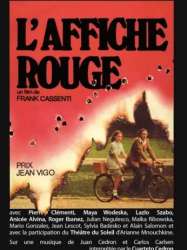
L'Affiche rouge (1976)
, 1h29Directed by Frank Cassenti
Origin France
Genres Drama
Themes Histoire de France, L'Occupation allemande en France, La condition juive en France sous l'Occupation allemande
Actors Pierre Clémenti, Roger Ibáñez, László Szabó, Malka Ribowska, Anicée Alvina, Maya Wodecka
Le film retrace l'histoire du groupe Manouchian, surnommé "L'armée du crime", composé de vingt-trois résistants (dont une femme qui fut décapitée ultérieurement), la plupart d'origine étrangère, fusillés à l'aube du 21 février 1944 sur le Mont Valérien, pour l'exemple. Une trentaine d'années plus tard des comédiens s'apprêtent à recevoir certains survivants de cette douloureuse période qui ont connu ou côtoyé ces martyrs de la Résistance et qui souhaitent faire corps avec les acteurs présents qui s'apprêtent à investir les personnages des divers résistants pour mettre en scène le souvenir et la mémoire des victimes et des rares rescapés de l'époque...
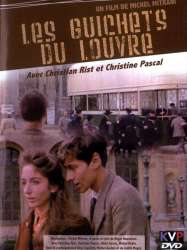
Black Thursday (1974)
, 1h35Directed by Laurent Heynemann, Claude Othnin-Girard
Origin France
Genres Drama, Historical
Themes Histoire de France, L'Occupation allemande en France, La condition juive en France sous l'Occupation allemande
Actors Christian Rist, Christine Pascal, Judith Magre, Henri Garcin, Michel Robin, Michel Auclair
On 16 July 1942, in Paris. A young student, Paul, tries to save some of the Jews being rounded up by Nazis to ship off to concentration camps.

Violins at the Ball (1974)
, 1h40Directed by Michel Drach
Origin France
Genres Drama, War
Themes Films about children, Histoire de France, L'Occupation allemande en France, La condition juive en France sous l'Occupation allemande
Actors Jean-Louis Trintignant, Marie-Josée Nat, Gabrielle Doulcet, Michel Drach, Luce Fabiole, Christian Rist
C'est l'histoire d'un cinéaste qui veut réaliser depuis 20 ans le même film, autobiographique. Parallèlement à sa vie actuelle, il tourne avec un opérateur en reportage et avec des petits moyens, une chronique du temps présent. Tous les éléments de sa vie d'enfant, vie rêvée, souvenirs transposés et irréalistes, viennent se confondre au présent.
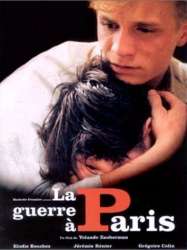
The War in Paris (2002)
, 1h25Directed by Yolande Zauberman
Origin France
Genres Drama
Themes Histoire de France, L'Occupation allemande en France, La condition juive en France sous l'Occupation allemande
Actors Élodie Bouchez, Jérémie Rénier, Grégoire Colin, Jean-Pierre Léaud, Ivan Franek, Hélène Lapiower
A Paris, en 1943, Jules, un juif de dix-neuf ans, vit sans idéal, ballotté par les circonstances. Il devient tour à tour traître puis héros. Thomas, son frère de quinze ans, veut, pour sa part, agir et se battre dans la résistance. Tous deux aiment Ana Maria, une résistante espagnole prête à se sacrifier pour libérer la France occupée. Ces jeunes gens vont faire leur apprentissage de la vie en étant confrontés à des évènements historiques exceptionnels.

The Two of Us (1967)
, 1h30Directed by Claude Berri
Origin France
Genres Drama, Comedy
Themes L'adolescence, Films about education, Films about children, Vieillesse, Political films, Films about school violence, Histoire de France, L'Occupation allemande en France, La condition juive en France sous l'Occupation allemande
Actors Michel Simon, Charles Denner, Luce Fabiole, Alain Cohen, Roger Carel, Paul Préboist
Claude (Alain Cohen) is an 8-year-old Jewish boy living in France during the Nazi occupation. To reduce the chance that he would be sent to Auschwitz or a similar fate, his parents send him to live with a farm family, the elderly parents of Catholic friends of his parents. (In reality, many French urban Jews made similar choices for their children.) The elderly couple honestly think that the boy has been sent to live with them because Paris is dangerous; it never crosses their mind that Claude is a Jew.
 Connection
Connection